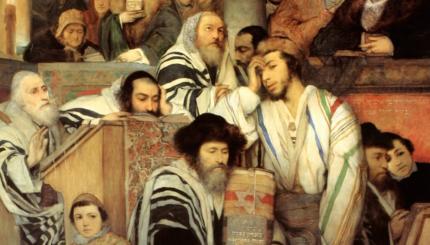, also known as Grace After Meals, is a series of blessings of thanksgiving recited after eating a meal. But it’s not just about food; only the first of the set of blessings in the Birkat Hamazon explicitly thank God for food. The remainder thank God for the land of Israel and his general goodness, plead for the rebuilding of Jerusalem, and make a series of requests for livelihood, the coming of the messiah, and more.
The simple reason for expanding this prayer beyond food traces to the biblical source of saying Grace After Meals. In Deuteronomy 8:10, Moses delivers this instruction to the Jewish people: “When you have eaten your fill, give thanks to the Lord your God for the good land which He has given you.”
The blessing, according to Moses, is not for the food one eats, but “for the good land.” This makes some sense, of course. Food ultimately comes from land, so by thanking God for land, we are implicitly thanking him also for the bounty of the land. But the length and breadth of Grace After Meals — particularly compared to the much shorter and more focused blessings the rabbis ordained should be said prior to eating — suggest a larger objective than mere gratitude for food.
Moses’ instruction comes in the context of a long speech to the Jewish people prior to their entry into the land of Israel. This amounts to something of a valedictory for Moses, who will not be accompanying his followers to the promised land after leading the Jewish people out of Egypt and through their wanderings in the desert. These are among his final parting words for a people soon to venture forth without him.

Help us keep Jewish knowledge accessible to millions of people around the world.
Your donation to My Jewish Learning fuels endless journeys of Jewish discovery. With your help, My Jewish Learning can continue to provide nonstop opportunities for learning, connection and growth.
For most of Moses’ period of leadership, God’s authority was routinely and obviously manifest. There were the miracles surrounding the Exodus — the plagues on Egypt, the splitting of the sea — followed by the revelation at Sinai and the protections afforded during the wandering in the wilderness. None of this prevented the ancient Israelites from going astray (see: calf, golden). But reminders of their ultimate dependance on a higher power were often in evidence.
Now the Israelites are entering a new period in their history. They will take possession of land. They will establish sovereignty, drive out their enemies, plant fields and vineyards in a land God promised will overflow with abundance. It is precisely at that moment — of abundance, security, satiety — that expressing faith and gratitude become vitally important.
Comfort and security, Moses is telling the Jewish people, may be wonderful — but they are also spiritually perilous. The temptation will be to forget God and revel in the human power over nature. Contentment can lead to arrogance. A bountiful meal, elegantly prepared, purchased with one’s own money (or grown in one’s own garden) can lead to a sense of overconfidence in our power.
This is why Grace After Meals is so much longer and broader than the short blessings said before eating. It is a reminder to be grateful for all our blessings — not just food, but a healthy planet, loving parents and family, a sufficient livelihood. None of these things come to us solely as a result of our personal efforts. And it is precisely at the moment when our bellies are full and our immediate physical needs have just been satisfied that this reminder is most needed.



